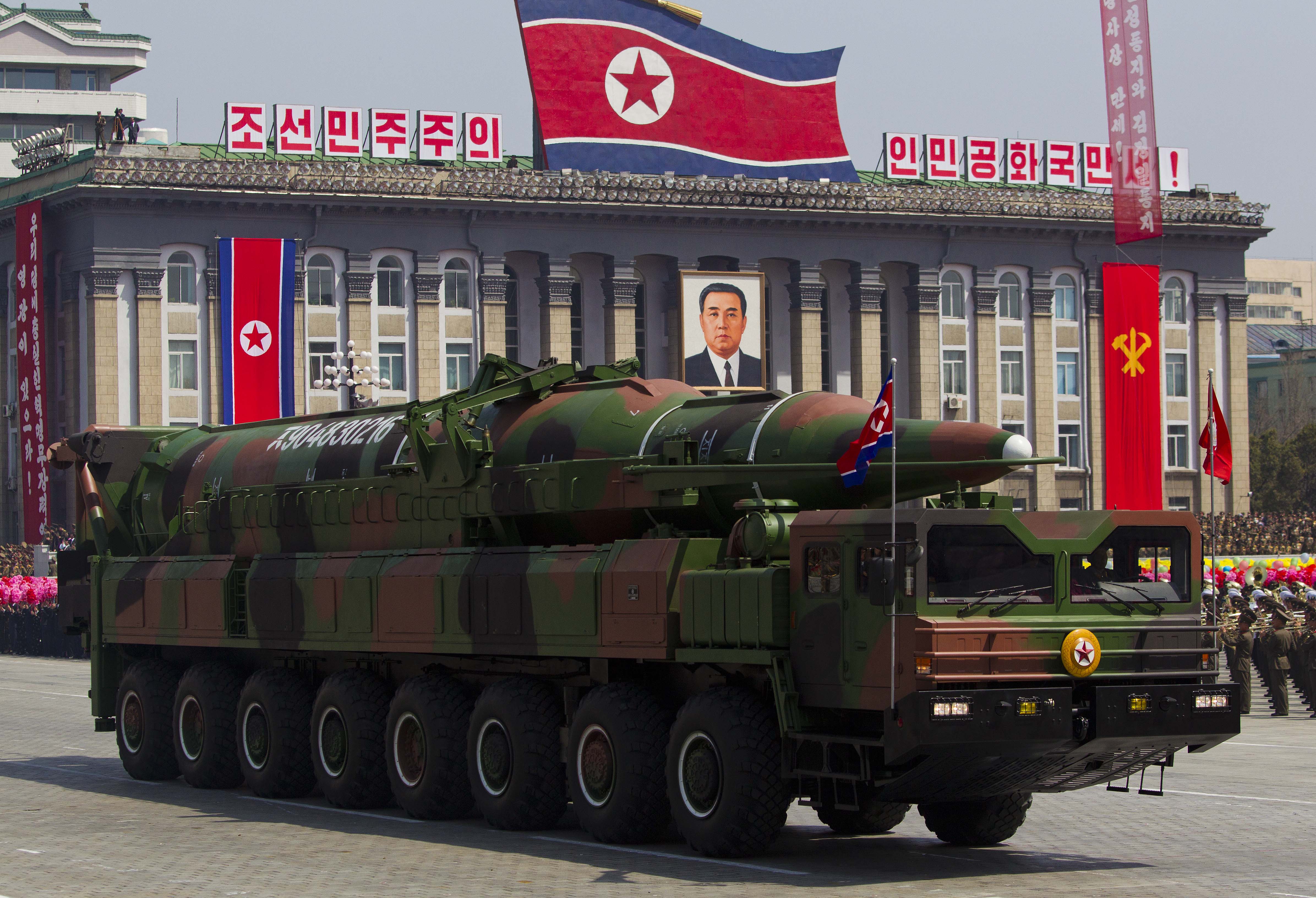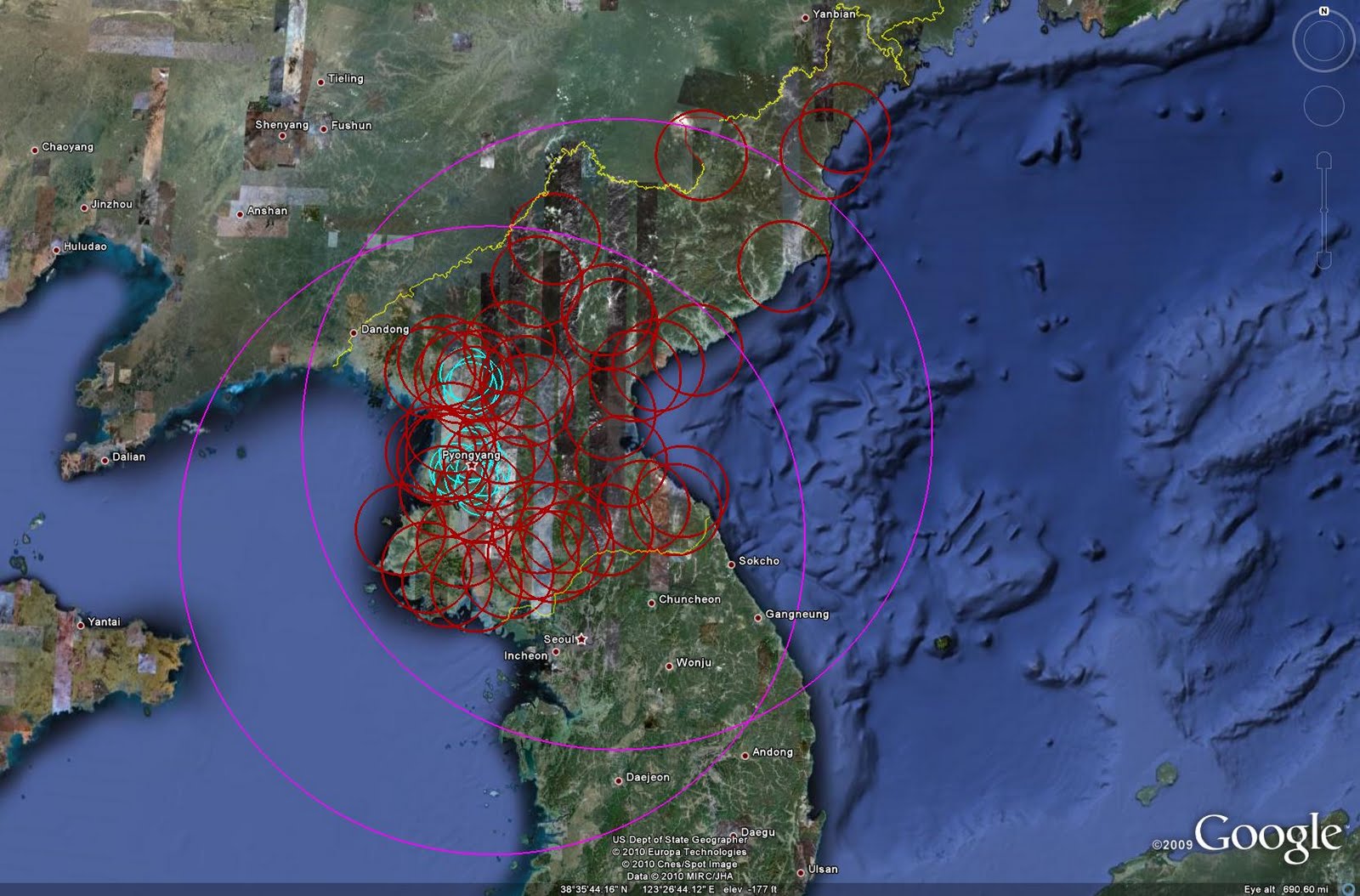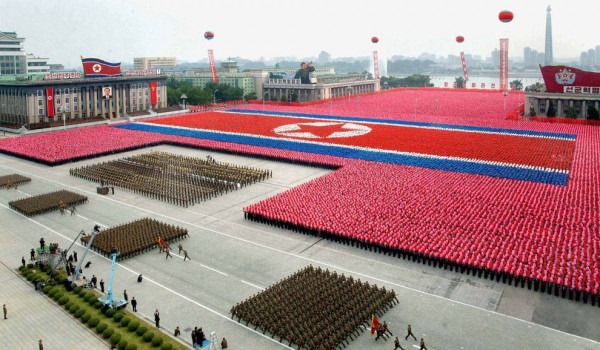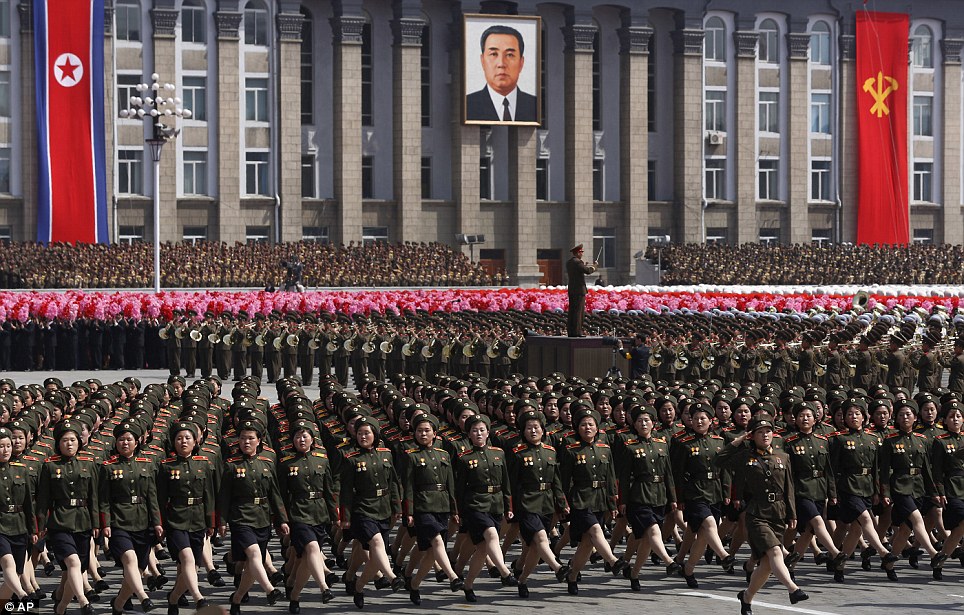longbrained
SENIOR MEMBER

- Joined
- Mar 28, 2011
- Messages
- 3,390
- Reaction score
- 0
The days are gone forever when our enemies could blackmail us with nuclear bombs. Kim Jong-un, speaking today at the parade.
North Korean Leader Stresses Need for Strong Military
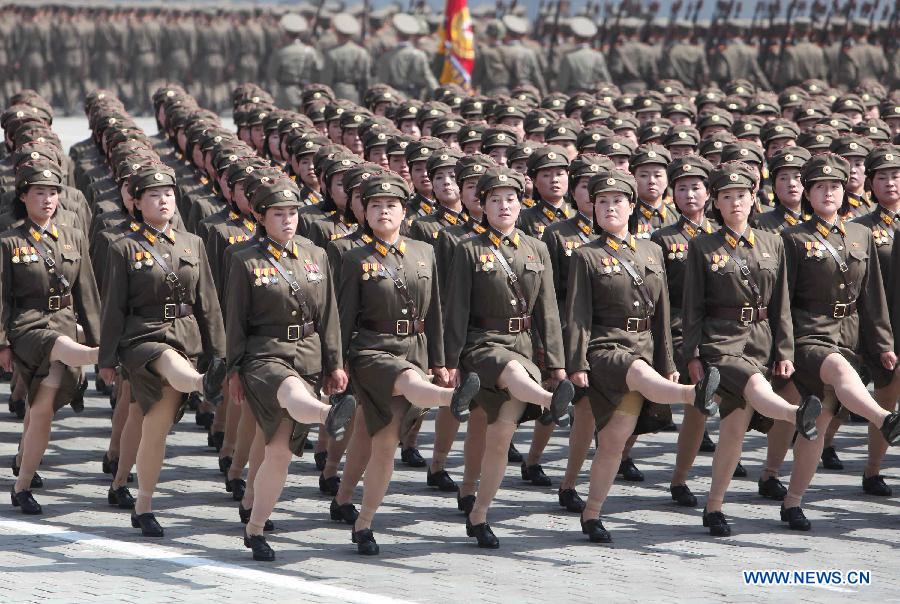
http://www.nytimes.com/2012/04/16/w...-superiority-in-first-public-speech.html?_r=1
In his first speech in public since assuming the leadership of North Korea, Kim Jong-un said Sunday that his first, second and third priorities were to strengthen the military, and he declared that superiority in military technology was no longer monopolized by imperialists.
Mr. Kims speech was followed by what South Korean officials said was the Norths biggest display of weapons in a military parade, including a missile the North appeared to be presenting for the first time. While it is not clear whether it was a new long-range missile or a mock-up, its display demonstrates the importance that the North Korean government places on weapons development despite an embarrassing failure of a rocket it launched last week.
South Korean officials would not comment on the North Korean missile, pending further examination.
Mr. Kims claim to superior military technology could sound poignant, coming two days after the North Korean rocket carrying a satellite disintegrated in midair. The failure of the rocket indicated that North Korea might still have a long way to go before mastering the technology to deliver warheads atop an intercontinental ballistic missile.
Mr. Kims speech on the 100th birthday of Kim Il-sung, his grandfather and the Norths founding president, was his public political debut. In an unexpected 20-minute speech, broadcast live inside North Korea, Mr. Kim demonstrated a new leadership style but reaffirmed his adherence to the military first policy of his father, Kim Jong-il, which has left North Korea locked in a prolonged confrontation with the United States and its allies.
His speech was a major departure from the practices of his reclusive father, who cloaked his brutal rule in mystery and who never gave a speech to the general public before his death in December. North Koreans did not even hear Kim Jong-ils voice until a broadcast in 1992, when he shouted one sentence into the microphone while inspecting a military parade: Glory to the heroic soldiers of the Peoples Army.
On Sunday, facing tens of thousands gathered in a plaza in the capital, Pyongyang, Mr. Kim did not mention the rocket failure. Instead, he exhorted his people to appreciate the achievements of his father and grandfather, crediting them with developing nuclear weapons as a deterrent against American invasion.
The days are gone forever when our enemies could blackmail us with nuclear bombs, he said.
Mr. Kim has been seen but not heard by the public since taking over after his fathers death. A thunderous cheer erupted when he appeared on the podium, waving a hand at the crowd gathered beneath in neat rows for the meticulously choreographed festivities. Thousands of balloons were released.
An emotional North Korean television broadcaster marveled at how the young leader had the look and voice of his charismatic grandfather, who is much revered in the North. Reading a prepared text, Mr. Kim spoke in a calm, measured and somewhat husky voice, occasionally looking up from the text to squint at the crowd under the sun.
The only gesture he made was when he raised a finger to emphasize the last sentence of his speech: Lets go on for our final victory.
Analysts said that Mr. Kims physical resemblance to his grandfather, his gregariousness in the public eye easily mixing with soldiers, workers and aging generals and even his willingness to address the nation on state television were carefully cultivated assets for a leader in his late 20s hoping to give his government a more youthful appeal. (The portraits of Marx and Lenin that once adorned prominent buildings in Pyongyang were taken down ahead of the Sunday celebrations, The Associated Press reported from the North Korean capital.)
Cheong Seong-chang of the Sejong Institute, a private research institute in South Korea, said Mr. Kims performance reminded North Koreans of Kim Il-sung, who as a young leader used to meet citizens and give public speeches. Kim Jong-il inspired awe and dread among his people and was never a leader friendly with the public, Mr. Cheong said. Like his grandfather, however, Kim Jong-un has so far tried to look more willing to communicate with his people. We may see him speak in public more often.
Sundays speech and parade were the culmination of weeks of festivities intended to infuse the North Koreans with pride that their country, as its propagandists put it, has become a military power despite decades of economic hardship.
Yesterday, we were a weak and small country trampled upon by big powers, Mr. Kim said. Today, our geopolitical location remains the same, but we are transformed into a proud political and military power and an independent people that no one can dare provoke.
He said he was determined to make sure that his people will never have to tighten their belt again. Yet he did not offer concrete economic programs, other than a vague reference to the need for an industrial revolution. Neither did he mention that his rocket launching had led to the cancellation of badly needed American food aid.
The United States and its allies have called for censuring North Korea at the United Nations Security Council. But China appealed for all sides to remain calm and exercise restraint on Sunday after its foreign minister, Yang Jiechi, talked with Secretary of State Hillary Rodham Clinton and the South Korean foreign minister, Kim Sung-hwan, in separate telephone conversations.
Some analysts say that the insecurity created by the rocket failure may push Kim Jong-un to rely more heavily on the military and attempt an even more provocative nuclear test in an effort to be taken seriously. The Korean Peoples Army, with about 1.1 million troops, has become the backbone of political power under Kim Jong-ils military first policy.
Kim Jong-un is not secure enough to endorse a possible demand from moderates in his government for policy shifts after the rocket debacle, said Chang Yong-seok, a senior researcher at Seoul National Universitys Institute for Peace and Unification Studies. He still relies on his dead fathers authority to justify his rule.
Hours after the failure of the rocket marred his ascension to North Koreas highest posts, Mr. Kim promoted 70 officers to the rank of general, the Norths main ruling party newspaper, Rodong Sinmun, reported Saturday.
Mr. Kim ordered the promotions as one of his first actions after becoming chairman of the National Defense Commission. The post was the last of the top military, party and state titles he has inherited from his father.
North Korean Leader Stresses Need for Strong Military

http://www.nytimes.com/2012/04/16/w...-superiority-in-first-public-speech.html?_r=1
In his first speech in public since assuming the leadership of North Korea, Kim Jong-un said Sunday that his first, second and third priorities were to strengthen the military, and he declared that superiority in military technology was no longer monopolized by imperialists.
Mr. Kims speech was followed by what South Korean officials said was the Norths biggest display of weapons in a military parade, including a missile the North appeared to be presenting for the first time. While it is not clear whether it was a new long-range missile or a mock-up, its display demonstrates the importance that the North Korean government places on weapons development despite an embarrassing failure of a rocket it launched last week.
South Korean officials would not comment on the North Korean missile, pending further examination.
Mr. Kims claim to superior military technology could sound poignant, coming two days after the North Korean rocket carrying a satellite disintegrated in midair. The failure of the rocket indicated that North Korea might still have a long way to go before mastering the technology to deliver warheads atop an intercontinental ballistic missile.
Mr. Kims speech on the 100th birthday of Kim Il-sung, his grandfather and the Norths founding president, was his public political debut. In an unexpected 20-minute speech, broadcast live inside North Korea, Mr. Kim demonstrated a new leadership style but reaffirmed his adherence to the military first policy of his father, Kim Jong-il, which has left North Korea locked in a prolonged confrontation with the United States and its allies.
His speech was a major departure from the practices of his reclusive father, who cloaked his brutal rule in mystery and who never gave a speech to the general public before his death in December. North Koreans did not even hear Kim Jong-ils voice until a broadcast in 1992, when he shouted one sentence into the microphone while inspecting a military parade: Glory to the heroic soldiers of the Peoples Army.
On Sunday, facing tens of thousands gathered in a plaza in the capital, Pyongyang, Mr. Kim did not mention the rocket failure. Instead, he exhorted his people to appreciate the achievements of his father and grandfather, crediting them with developing nuclear weapons as a deterrent against American invasion.
The days are gone forever when our enemies could blackmail us with nuclear bombs, he said.
Mr. Kim has been seen but not heard by the public since taking over after his fathers death. A thunderous cheer erupted when he appeared on the podium, waving a hand at the crowd gathered beneath in neat rows for the meticulously choreographed festivities. Thousands of balloons were released.
An emotional North Korean television broadcaster marveled at how the young leader had the look and voice of his charismatic grandfather, who is much revered in the North. Reading a prepared text, Mr. Kim spoke in a calm, measured and somewhat husky voice, occasionally looking up from the text to squint at the crowd under the sun.
The only gesture he made was when he raised a finger to emphasize the last sentence of his speech: Lets go on for our final victory.
Analysts said that Mr. Kims physical resemblance to his grandfather, his gregariousness in the public eye easily mixing with soldiers, workers and aging generals and even his willingness to address the nation on state television were carefully cultivated assets for a leader in his late 20s hoping to give his government a more youthful appeal. (The portraits of Marx and Lenin that once adorned prominent buildings in Pyongyang were taken down ahead of the Sunday celebrations, The Associated Press reported from the North Korean capital.)
Cheong Seong-chang of the Sejong Institute, a private research institute in South Korea, said Mr. Kims performance reminded North Koreans of Kim Il-sung, who as a young leader used to meet citizens and give public speeches. Kim Jong-il inspired awe and dread among his people and was never a leader friendly with the public, Mr. Cheong said. Like his grandfather, however, Kim Jong-un has so far tried to look more willing to communicate with his people. We may see him speak in public more often.
Sundays speech and parade were the culmination of weeks of festivities intended to infuse the North Koreans with pride that their country, as its propagandists put it, has become a military power despite decades of economic hardship.
Yesterday, we were a weak and small country trampled upon by big powers, Mr. Kim said. Today, our geopolitical location remains the same, but we are transformed into a proud political and military power and an independent people that no one can dare provoke.
He said he was determined to make sure that his people will never have to tighten their belt again. Yet he did not offer concrete economic programs, other than a vague reference to the need for an industrial revolution. Neither did he mention that his rocket launching had led to the cancellation of badly needed American food aid.
The United States and its allies have called for censuring North Korea at the United Nations Security Council. But China appealed for all sides to remain calm and exercise restraint on Sunday after its foreign minister, Yang Jiechi, talked with Secretary of State Hillary Rodham Clinton and the South Korean foreign minister, Kim Sung-hwan, in separate telephone conversations.
Some analysts say that the insecurity created by the rocket failure may push Kim Jong-un to rely more heavily on the military and attempt an even more provocative nuclear test in an effort to be taken seriously. The Korean Peoples Army, with about 1.1 million troops, has become the backbone of political power under Kim Jong-ils military first policy.
Kim Jong-un is not secure enough to endorse a possible demand from moderates in his government for policy shifts after the rocket debacle, said Chang Yong-seok, a senior researcher at Seoul National Universitys Institute for Peace and Unification Studies. He still relies on his dead fathers authority to justify his rule.
Hours after the failure of the rocket marred his ascension to North Koreas highest posts, Mr. Kim promoted 70 officers to the rank of general, the Norths main ruling party newspaper, Rodong Sinmun, reported Saturday.
Mr. Kim ordered the promotions as one of his first actions after becoming chairman of the National Defense Commission. The post was the last of the top military, party and state titles he has inherited from his father.





